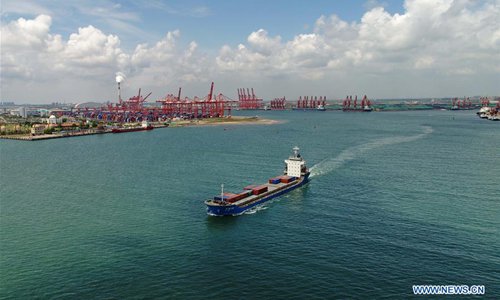Cargo ships to face new fuel requirements
Rules will help protect environment but lead to higher costs

Aerial photo taken on July 10, 2019 shows a cargo ship leaving the Jingtang port area of Tangshan Port, north China's Hebei Province. (Photo: Xinhua)
Tens of thousands of cargo ships will have to start using less polluting fuels in January, a boon for the environment that could however lead to higher bills for consumers.
The International Maritime Organization decided in 2016 that the sulphur levels in fuels for ships would have to fall to 0.5 percent in 2020, compared to 3.5 percent currently.
The idea is to reduce the emission of highly toxic sulphur dioxide - a health hazard also responsible for causing acid rain - by the nearly 80,000 cargo ships which ply the seas delivering raw materials and merchandise. The shipping industry is critical to the global economy but the pollution it generates is estimated to cause 400,000 premature deaths and 14 million cases of asthma among children per year, according to a 2018 article in the magazine Nature.
Shipowners have several options to meet the new regulations.
One is to continue with heavy fuel oil but install scrubbers that remove sulphur from the exhaust fumes. But these can be expensive, and some models dump the water used to clean the exhaust into the ocean, a practice that some say could get them banned, too.
A second option is for shipowners to convert their vessels to run on liquefied natural gas (LNG), a fuel which is much less polluting. So far few have chosen this option as LNG fuelling infrastructure doesn't exist in all ports.
The easiest option for many is to switch to new fuels with low sulphur content or marine diesel oil.
Around 3.6 million barrels of oil per day are used to produce the fuels used by the shipping industry. Around one-sixth of the total is expected to remain dedicated to production of high-sulphur content heavy fuel oil for vessels equipped with scrubbers or those which do not immediately comply with the new regulations.
"That leaves about 3 million barrels a day that needs to adjust to the 0.5 percent fuel regulation" said Chris Midgley, head of analytics at S&P Global Platts.
The International Energy Agency said recently that the oil products market is heading for its "largest ever transformation" as refiners "will need to adapt to a new demand landscape."
The first impact on shipowners will likely be an increase in costs.
Fuels that meet the new regulations are more complicated to produce and are "two times more expensive, but we could see an even larger increase with higher demand," said Nelly Grassin of Armateurs de France.